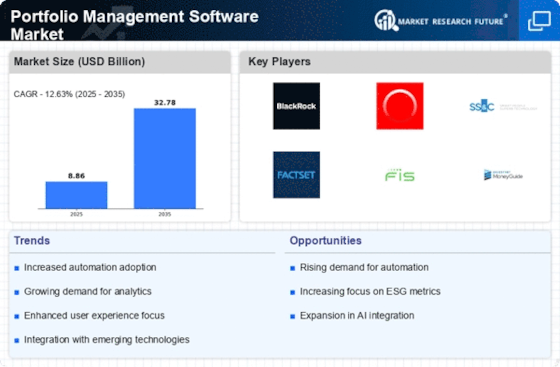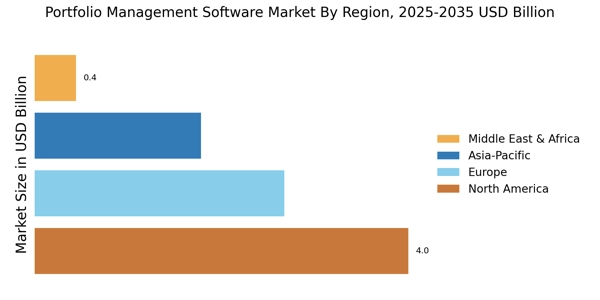Emergence of ESG Investing
The Portfolio Management Software Market is increasingly influenced by the emergence of Environmental, Social, and Governance (ESG) investing. As investors become more conscious of sustainability and ethical considerations, portfolio management software is evolving to incorporate ESG metrics and analytics. This trend is reflected in the growing number of investment firms that are integrating ESG factors into their portfolio strategies. Recent data indicates that approximately 30% of new investments are now directed towards ESG-compliant portfolios, highlighting the need for software that can effectively track and report on these criteria. Consequently, portfolio management software providers are enhancing their platforms to include ESG data integration, enabling users to assess the sustainability of their investments. This shift not only aligns with changing investor preferences but also positions portfolio management software as a critical tool for firms aiming to attract socially responsible investors.
Rising Demand for Data Analytics
The Portfolio Management Software Market is experiencing a notable surge in demand for data analytics capabilities. As organizations increasingly rely on data-driven decision-making, the need for sophisticated analytics tools within portfolio management software has become paramount. According to recent estimates, the market for data analytics in portfolio management is projected to grow at a compound annual growth rate of approximately 12% over the next five years. This growth is driven by the necessity for firms to analyze vast amounts of financial data to optimize investment strategies and enhance performance. Consequently, software providers are integrating advanced analytics features, enabling users to gain deeper insights into market trends and portfolio performance. This trend not only enhances the functionality of portfolio management software but also positions it as an essential tool for investment professionals seeking to maintain a competitive edge.
Increased Focus on Risk Management
In the current landscape, the Portfolio Management Software Market is witnessing an increased emphasis on risk management solutions. Financial institutions and investment firms are recognizing the critical importance of identifying, assessing, and mitigating risks associated with their portfolios. As a result, portfolio management software is evolving to incorporate robust risk assessment tools that allow users to simulate various market scenarios and evaluate potential impacts on their investments. Recent data indicates that the demand for risk management features within portfolio management software has risen by approximately 15% in the past year. This shift reflects a broader trend towards proactive risk management strategies, as firms aim to safeguard their assets and ensure compliance with regulatory requirements. The integration of advanced risk analytics into portfolio management software is likely to enhance decision-making processes and improve overall portfolio resilience.
Technological Advancements in Automation
The Portfolio Management Software Market is witnessing rapid technological advancements, particularly in automation. As firms strive to enhance efficiency and reduce operational costs, the integration of automation features within portfolio management software is becoming increasingly vital. Recent analyses suggest that automation in portfolio management can lead to a reduction in manual processes by up to 40%, thereby allowing investment professionals to focus on strategic decision-making. This trend is driving software developers to incorporate automated reporting, trade execution, and portfolio rebalancing functionalities into their offerings. As a result, the demand for automated portfolio management solutions is expected to rise significantly, with projections indicating a growth rate of around 18% over the next few years. This evolution not only streamlines operations but also enhances the accuracy and speed of portfolio management processes, positioning firms to respond more effectively to market changes.
Growing Adoption of Cloud-Based Solutions
The Portfolio Management Software Market is experiencing a significant shift towards cloud-based solutions. As organizations seek to enhance operational efficiency and reduce IT costs, the adoption of cloud technology in portfolio management is becoming increasingly prevalent. Recent statistics suggest that the market for cloud-based portfolio management software is expected to grow by over 20% annually in the coming years. This growth is attributed to the flexibility, scalability, and accessibility that cloud solutions offer, allowing investment professionals to manage portfolios from anywhere at any time. Furthermore, cloud-based software often includes automatic updates and enhanced security features, which are appealing to firms looking to streamline their operations. As a result, the transition to cloud-based portfolio management solutions is likely to reshape the competitive landscape, compelling traditional software providers to adapt their offerings to meet evolving client needs.

















